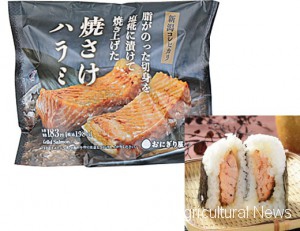TOKYO, Nov. 10 — Japanese convenience store chains have raised prices of onigiri, or Japanese rice balls stuffed with a variety of delicious fillings, to pass on rice price increases to consumers.
Store chains had been being hesitant to pass price increases onto consumers.
But some of them started raising onigiri prices due to an increase in commercial rice prices for 2017, and the trend will grow throughout the convenience store industry, observers say.
In October, Lawson Inc. raised prices for some of its onigiri lineups at its 127,000 outlets in Japan.
The price of a rice ball filled with tuna and mayonnaise rose from 110 yen to 116 yen. One with a Japanese salty pickled plum now costs 120 yen, up from 110 yen.
The same thing goes with more pricy onigiri. An onigiri that uses Japanese Koshihikari, dubbed as the king of rice, filled with grilled salmon is now priced at 198 yen, up from 168 yen.
“We have not simply passed on rice increases to consumers. We have added new value with new onigiri product lines,” a Lawson official explains.
Other supermarkets have their ways: They cut the rice volume by 5 grams, while maintaining onigiri prices; effectively it means raising product prices.


